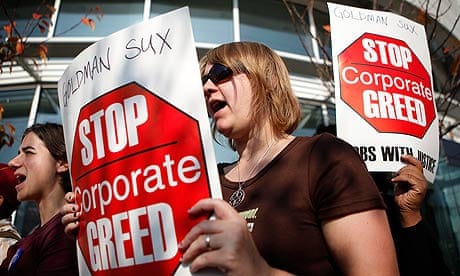Wall Street bank Goldman Sachs has blinked in the face of a public outcry over its multimillion-dollar pay packages by suspending cash bonuses for its top 30 executives, in a concession to critics delivered as political momentum mounts for a crackdown on rewards in the financial sector.
Goldman is typically the biggest payer of any leading US bank, with a policy of distributing more than 40% of its revenue to employees, and it has faced furious protests over an anticipated handout of $23bn (£14.1bn) this year, an average of more than $700,000 per employee.
The bank announced that its senior staff, including six London-based executives, would receive shares vesting over a five-year period instead of cash bonuses. Under enhanced "clawback" powers, it will be able to reclaim shares from any employees found to have inflicted "material financial harm" on its businesses. In an unprecedented move for a major US bank, Goldman will put its remuneration policies before a yearly "say on pay" vote by shareholders at its annual meetings.
A Goldman spokesman said the bank had taken public opinion into consideration: "The motivation was that these are extraordinary times, that the firm has done well and that that has excited a great deal of comment and not a little criticism."
Before the financial crisis hit, Goldman's chief executive, Lloyd Blankfein, was the best-paid bank boss on Wall Street, taking home $68.5m in 2007, while two of his top lieutenants earned $67.5m each. Protesters have picketed the bank's offices and, wary of bad publicity, Goldman recently banned any Christmas parties attended by more than a dozen employees. The US treasury secretary, Timothy Geithner, recently pointed out that Goldman would have collapsed had it not been for the US government's support of the banking industry.
The bank's change in pay policy came as critics of Wall Street pay took heart from Britain's decision to impose a 50% tax on bonuses. Although the Obama administration has shown no inclination to emulate chancellor Alistair Darling's initiative, the tax has been greeted with concern in US banking circles and has energised unions and left-leaning coalitions demanding an end to big rewards in the financial industry.
"Goldman Sachs is worried. They're worried about the public reaction to bonuses they're paying in the worst recession since the war," said Alan Charney, programme director for US Action, a union-backed campaign group.
The US treasury has declined to comment on its view of Britain's tax on bonuses, although a handful of left-leaning members of Congress, including the former Democratic presidential candidate Dennis Kucinich, have called for a similar levy in the US.
Total bonus payouts on Wall Street are set to rise 40% to $26bn this year. The Obama administration has appointed a so-called "compensation tsar", Kenneth Feinberg, to examine pay policies, although his remit only extends to banks being propped up by taxpayers' bailout funds.
Steve Hall, a New York-based pay consultant who advises US companies on devising remuneration, said there was concern at the prospect of a tax gaining international impetus, following France's decision to follow Britain by implementing a bonus tax: "This is spreading – this is worse than swine flu."
Hall said it was unlikely that Congress would entertain such a tax, although he pointed out that an effort to impose a 90% levy on controversial payouts at the insurer AIG gained support in the House of Representatives earlier this year: "The climate's so strange and scary these days, who knows what will happen?"
President Obama is due to host a meeting at the White House on Monday with leading banking chiefs including the heads of Goldman, Citigroup and Bank of America, where pay policies are sure to be on the agenda.
The chief executive of General Electric, Jeffrey Immelt, this week added his voice to alarm over remuneration at the top levels of business, telling an audience at the West Point military academy that "meanness and greed" had infected senior figures in the corporate world and that rewards had become "perverted".
But the governor of the state of New York, David Paterson, has urged people to stop attacking banks, wary that the financial industry accounts for a large slice of his state's tax take. He urged New Yorkers to stand behind Wall Street bankers just as the people of rural Iowa defend corn production: "We need to stand behind the engine of our economy in New York, and that engine is Wall Street."
